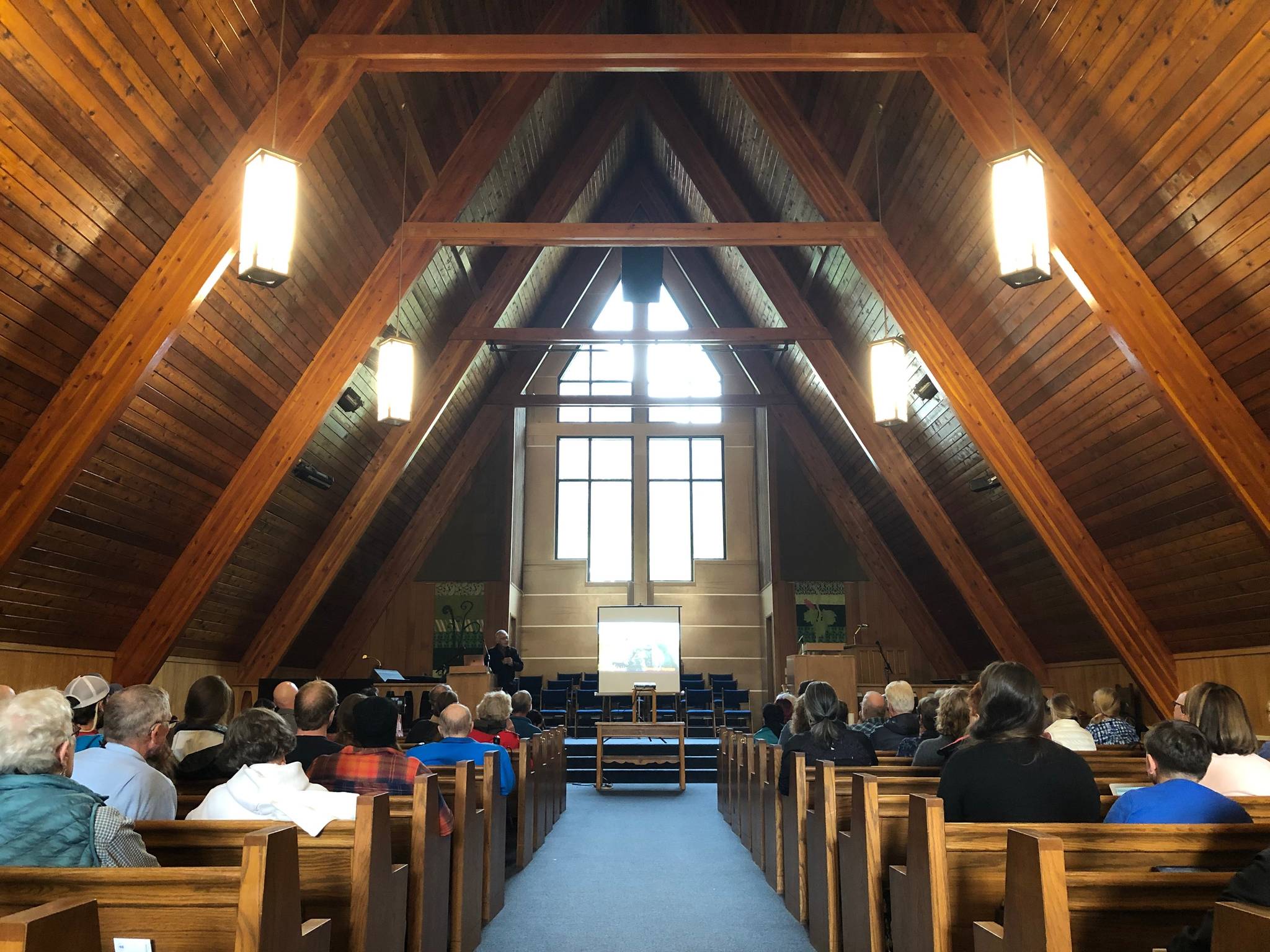Summary: Each of the speakers sought to convey the urgency which they saw in the environment. Each speaker talked about how they had witnessed the environment in Alaska change over their lifetimes in ways that they felt jeopardized not only the way of life for Alaska Natives, but for society and the environment more generally. The point that humans were not separate from the natural environment was made several times throughout the evening.
6:30 p.m.
“The evening tastes good,” says Ilarion (Larry) Merculieff, which is a typical greeting of the Unangan people, he says.
Most of the world doesn’t know about my people, he says, even some of his own people. He says that his people have a pre-contact world for “billion,” one of the few cultures in the world to have such a word pre-industry.
“You can’t count a billion anything,” he says. “Why would we have a word for a billion?” he asks rhetorically. “I’ll leave you with that,” he says.
He says that his culture didn’t view themselves as apart or separate from the natural world, from animals. They didn’t consider themselves any higher or lower than any animal. It was when people started to see themselves as above animals that “they lost their way,” he says.
“We must shift our consciousness from the mind to the heart,” he says. We must be focused on that which we want to see happen in our hearts.
Mother Earth’s life-support systems are coming to the edge, we’ve got very little time left, he says.
“This is the generation that’s going to decide if human beings are going to be here. That’s quite a responsibility.”
He says that all the laws for living have been reversed and we do not stop to contemplate, “what have we wrought?”
6:09 p.m.
“What you’re hearing from me is not any kind of special wisdom because I’ve been here,” David Katzeek says, “it’s what my grandparents told me.” He is speaking first in Tlingit, then in English.
Some people are behaving as if they own the earth, and that they can do whatever they want to it, Katzeek says.
“We are seeing the symptoms of that kind of behavior,” he says, referring to the degradation of the environment being discussed throughout the evening.
“When the Tlingit person says ‘community’ we’re including the creatures of the Earth,” he says.
“All the stuff that’s happening out there is the result of egotistical thinking, regardless of the color of your skin, the language you speak. It has its consequences.”
He urges the audience to think like the kindergartners he teaches and have fun, because the creativity that’s unleashed when you’re having fun is unmatched.
5:50 p.m.
Heather Evoy says that one of her favorite childhood memories was harvesting shellfish in the dark, covered in mud with a headlamp on.
But she says, it seems that she won’t be able to share that experience with her son, now 9, because of lower pH levels in the water.
“It was very difficult on some of those 70, 80 degree days to not take my kids to the beach,” she says.
(Her talk is interrupted briefly by someone bringing her a cup of hot tea. Her voice is hoarse due to shouting at Tuesday’s climate march, she says.)
Changing precipitation patterns are disrupting hydro-electric power in Southeast Alaska, forcing companies to use diesel fuel to run their generators.
5:40 p.m.
“In my life of 50 years, I have seen changes,” Melanie Brown says. She tells the crowd that even though she only returns to Bristol Bay in the summer she can notice that, “things are shifting.”
Brown says that in her travels in the state throughout her life, she’d noticed patterns in the natural environment that have recently been disrupted.
She cites this past summer, one of the hottest on record, as particularly disruptive. She said that the various berries that grow in the state can be harvested earlier in the year, something she attributes to the warmer environment.
Melting permafrost is causing the tundra to catch fire, she says. Some of the fires in the Alaskan tundra have gone unnoticed by many people because of the fires elsewhere in the state and in the Amazon.
5:24 p.m.
Brower asks the audience what we’re doing to educate our young people on the effects of climate change. He is showing pictures of thinning glacial ice and warming permafrost.
“Some of our food storage places are warming,” he tells the crowd. He showed pictures of holes dug in the ground traditionally used to store meat. Now you can find water at the bottom of the pits, if someone hadn’t come to check on the food it would’ve spoiled, he says.
Brower says that food security is becoming increasingly precarious for subsistence hunters.
5:12 p.m.
Alaska Natives are speaking on how climate change has affected tribal communities in Alaska at Northern Light United Church in downtown Juneau.
“Climate Change Through the Eyes of Alaska Natives” is hosted by Alaska Interfaith Power and Light and features five panelists.
Rev. Charles Brower is an Inupiaq elder from Barrow.
Heather Evoy is Tsimshian and Tlingit from Ketchikan.
Melanie Brown is a Yupik leader and commercial fishes with her family in Bristol Bay, where her Mother is from.
David Katzeek is a respected Tlingit elder and educator. He was born in Klukwan.
Ilarion (Larry) Merculieff has over 40 years experience serving his people, the Unangan (Aleut) of the Pribilof Islands.
• Contact reporter Peter Segall at 523-2228 or psegall@juneauempire.com.

